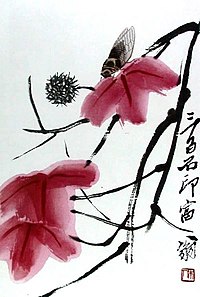齐白石(1864年1月1日-1957年9月16日),原名齐纯芝,字渭清,祖父取号兰亭,老师取名齐璜,字濒生,别号寄萍老人、白石山人,湖南湘潭人,近代中国国画画家。后人常将“山人”二字略去,故后常号“白石”。齐白石也和张大千并称“南张北齐”。
生平
齐白石于1864年元旦(同治二年十一月廿二日)出生于湖南省长沙府湘潭县(今湖南省湘潭县)白石铺杏子坞农民家庭,原名齐纯芝。自幼体弱多病。由于家族以务农为生,祖父齐万秉认为农耕不能赚钱,于齐白石4岁时起教授写字。于8岁时在公公所开设之蒙馆学习,半年后辍学,辍学后,协助家中务农。14岁起作木匠,学习雕花木工。后来兼习绘画,并拜萧芗陔为师。25岁时起拜名士胡沁园、陈少蕃等为师[1],由胡沁园替之取名为璜,号濒生,因家中靠近白石铺,故取别号白石山人。学习诗、书、画、篆刻。并开始兼以卖画为生,不再以雕花木工赚钱。

Qi Baishi (1 January 1864 – 16 September 1957) was a Chinese painter, noted for the whimsical, often playful style of his watercolor works.
Born to a peasant family from Xiangtan, Hunan, Qi became a carpenter at 14, and learned to paint by himself. When he came across the Mustard Seed Garden Manual of Painting, that sparked his interest to paint. He did not start learning painting and calligraphy until he was 27. After he turned 40, he traveled, visiting various scenic spots in China. After 1917 he settled in Beijing.
Some of Qi's major influences include the early Qing dynasty painter Bada Shanren (八大山人) and the Ming dynasty artist Xu Wei (徐渭).
His pseudonyms include Qí Huáng (齊璜) and Qí Wèiqīng (齐渭清). The subjects of his paintings include almost everything, commonly animals, scenery, figures, toys, vegetables, and so on. He theorized that "paintings must be something between likeness and unlikeness, much like today's vulgarians, but not like to cheat popular people". In his later years, many of his works depict mice, shrimp or birds.
He was also good at seal carving and called himself "the rich man of three hundred stone seals" (三百石印富翁).
In 1953, he was elected president of the China Artists Association (中國美術家協會). He died in Beijing in 1957.
20230228 04:45:34
all these pictures do not render on my browser.. for best result, your publishing press needs to have ‘ tighter’ coupling for all readership at large.
0 回复 查看 0 回复